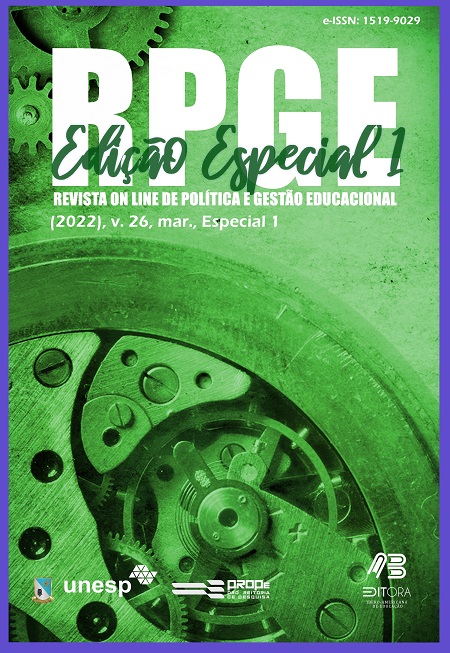El papel educativo de las redes sociales en la comunicación de políticas en Vietnam
DOI:
https://doi.org/10.22633/rpge.v26iesp.1.16513Palabras clave:
Red social, Comunicación política, Democratización, Consenso socialResumen
Profundamente consciente de las ventajas de las redes sociales, el Gobierno de Vietnam pronto utilizó las redes sociales como un nuevo medio de comunicación en el ciclo de políticas. Como resultado, las redes sociales han contribuido activamente a movilizar la participación de las personas en la gestión social, generando confianza en el gobierno y consenso social. Las redes sociales han jugado un cierto papel en la comunicación política. Este estudio muestra claramente que, además de las ventajas, el uso de las redes sociales en la comunicación de políticas en Vietnam también tiene muchas limitaciones e insuficiencias que deben superarse en un futuro próximo. A partir del estudio de los documentos estatales sobre políticas, se evalúa la situación actual de las políticas de comunicación política en los últimos años, donde se destaca el papel de la educación de las redes sociales; este estudio continúa aclarando el papel educativo de las redes sociales en la comunicación de políticas y, al mismo tiempo, recomienda soluciones para mejorar la calidad de la comunicación de políticas en el futuro.
Descargas
Citas
ACADEMY OF JOURNALISM AND COMMUNICATION. Social networks in the context of information development in Vietnam. In: SCIENTIFIC CONFERENCE UNDER THE STATE-LEVEL TOPIC KX.01.10/16-20, 2018. Proceedings […]. 2018.
CHADWICK, A. The Hybrid Media system: Politic and Power. United States of America: Oxford University Press, 2017.
MERCIER, A. et al. Political communication. Hanoi: Political theory, Hanoi, 2010.
CENTRAL PROPAGANDA DEPARTMENT. Reporters Handbook 2019. Hanoi, 2019. p. 27-30.
COMMUNIST PARTY OF VIETNAM. Document of the 13th National Congress of Deputies, Hanoi: National politics of truth, v. 1, n. 2, 2021.
KIRKPATRICH, D. The Facebook effect and the global revolution of social networking. Hanoi: World, 2011.
DUC, D. A. Discussing users creating content in the social network space. In: PRESS CONFERENCE IN THE FOURTH INDUSTRIAL REVOLUTION, 2019. Proceedings […]. 2019. p. 155.
DUNG, P. X. The fourth industrial revolution: the revolution of convergence and thrift. Hanoi: Science and Technology, Hanoi, 2018.
DUNG, N. V. Some issues of public policy communication in Vietnam today. Journal of Political Theory, v. 2, 2018.
JOWETT, G.; O'DONNELL, V. Propaganda and Persuasion. 5. ed. SAGE. Publications Inc, 2012.
GAM. Social Network. Hanoi: Labour, 2019.
PARKER, G. G.; ALSTYNE, M. W. V.; CHOUDARY, S. P. Platform revolution: Breakthroughs in technology application and ways to build new business models. Hanoi: Industry and Trade, 2017.
HA, Q. Stay awake when participating in social networks. Available: https://nhandan.com.vn/chinhtri/binh-luan-phe-phan/item/40378602-tinh-tao-khi-join-join-mang-xa-hoi.html. Access: 31 May 2019.
HANG, D. T. T. Traditional media or new traditions: content is always king. Journal of Political Theory and Communication, v. 3, p. 53-67, 2020.
HEIMANS, J.; TIMMS, H. New power. Publishing House General Ho Chi Minh City, 2019.
SUU, N. Q.; THANG, N. M. Social network management needs to approach development trends. Journal of Democracy and Law, v. 9, p. 310-318, 2018.
TAN, D. D. Press and Social Network. Ho Chi Minh City: Young Publishing House, 2017.
DIJCK, J. V. The culture of connectivity: a critical history of social media. United States of America: Oxford University Press, 2016
INEJI, P. U.; BASSEY-DUKE, V.; BROWN, N. J. Application of Political Propaganda by Government in the Resolution of ASUU/FGN Industrial Conflict of 2013. Advances in Journalism and Communication, v. 2, p. 103-112, 2014.
WASSERMAN; S.; FAUST, K. Social Network Analysis: Methods and Applications. Cambridge University Press, 1994.
FRIEDMAN, T. L. Thanks for being late. Ho Chi Minh City: Young Publishing House, 2018.
VIETNAM GENERAL CONFEDERATION OF LABOR. Using social networks in propaganda and advocacy work of the Vietnam Trade Union. 2019. Available: http://congdoan.vn/tin-tuc/tuyen-truyen-giao-duc-3576/su-dung-mang-xa-hoi-trong-cong-tac-tuyen-truyen-van-dong-cua-to-chuc-cong-doan-viet-nam-472704.tld. Access: 10 Jan. 2021.
VNETWORK. Vietnam Internet Statistics 2020. Available: https://vnetwork.vn/news/thong-ke-internet-viet-nam-2020. Access: 10 Jan. 2021.
UNIVERSITY OF SOCIAL SCIENCES AND HUMANITIES, VIETNAM NATIONAL UNIVERSITY, HANOI. Survey results of the Internet and Society Research Program (VPIS). 2017.
UNITED NATIONS. Declaration of Principles Building an Information Society: Global Challenges in the New Millennium. Section a, Article 49 (WSIS-03/GENEVA/DOC), Society Summit information. Geneva, 12 Dec. 2003.
Publicado
Cómo citar
Número
Sección
Licencia
Derechos de autor 2022 Revista on line de Política e Gestão Educacional

Esta obra está bajo una licencia internacional Creative Commons Atribución-NoComercial-CompartirIgual 4.0.
Manuscritos aceitos e publicados são de propriedade da Revista on line de Política e Gestão Educacional. É vedada a submissão integral ou parcial do manuscrito a qualquer outro periódico. A responsabilidade do conteúdo dos artigos é exclusiva dos autores. É vedada a tradução para outro idioma sem a autorização escrita do Editor ouvida a Comissão Editorial Científica.











